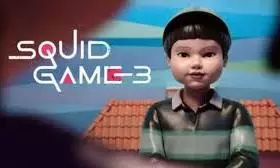
Season 3 of Squid Game feels like a shadow of its former self, a far cry from the sharp, unforgettable impact of the first season. While Lee Jung-jae’s return as Seong Gi-hun still holds some weight, the magic that made the series so gripping has long faded. It’s as if the show has hit a creative plateau, recycling ideas that no longer carry the same punch.
Picking up where Season 2 left off, Gi-hun is back, trying to help those who have found themselves trapped in the deadly game once again. His character, still haunted by past trauma, is determined to make a difference, but it all feels a bit like déjà vu—without the tension or originality we once felt. Even the return of Detective Hwang Jun-ho (played by Wi Ha-joon), who’s still hunting for the mysterious figures behind the games, fails to inject fresh energy. He’s still on the same mission as before, but the stakes no longer feel as urgent.
What worked so well in the first season—the high stakes, the sense of danger, the emotional rollercoaster—has turned into a repetitive cycle. The games themselves have lost their edge. The sets that once wowed with their elaborate design now feel rushed and uninspired, relying on CGI effects that lack the physicality and spectacle of earlier seasons. It’s a hollowed-out version of the Squid Game we once loved, where the visual design feels like a digital echo of what it could have been.
And then there’s the character deaths. Gone are the gut-wrenching moments that kept us on the edge of our seats. The show kills off every character in the most emotionally draining way possible, but none of it comes as a shock anymore. Fans of the original characters, from Hyun-ju (Park Sung-hoon) to the pregnant Jun-hee (Jo Yu-ri), can see their fates coming a mile away.
Jun-ho’s investigation, which should have been an exciting subplot, only serves to slow the pace down. Instead of offering new revelations or deepening the mystery, his journey feels stagnant, like we’re just treading water without any substantial progress. This could have been an opportunity to explore the larger world of Squid Game—its origins, its motivations—but instead, it drags on without ever revealing anything new.
However, it’s not all bad. Lee Jung-jae’s performance as Gi-hun continues to anchor the show, and it’s a reminder of how much talent the series has. Even in a weaker season, he manages to bring depth and emotion to his character’s struggle. His quiet grief and internal conflict are palpable, and he makes you feel the weight of every decision he makes. It’s clear that, despite the writing sometimes failing him, his portrayal of Gi-hun remains the heart of the series.
There are also moments where the show briefly flickers with its former brilliance. A surprise cameo in the final episode will likely spark online chatter, though it’s not enough to completely redeem the season. While the show may still manage to create some emotional moments, it’s hard to shake the feeling that we’re just watching an echo of the past, rather than something new and thrilling.
One of the few things that sets this season apart is the introduction of two new games. The first is a twisted, sadistic version of hide-and-seek, set in a maze-like chamber painted like Van Gogh’s Starry Night. The second is a nerve-wracking jump rope challenge over a narrow bridge. Both games are visually striking and force characters into impossible situations, but what really makes them stand out is the way they test moral limits. In the hide-and-seek episode, contestants must either kill or be killed, and the psychological weight of this scenario lingers long after the game is over. It’s the kind of tension that Squid Game used to excel at, but it’s no longer the game-changer it once was.
The series’ commentary on capitalism and human greed remains at the forefront, but this time, it feels less like a sharp critique and more like a well-worn metaphor. The rich are still playing their sickening game, the poor are still desperate for survival, but the insights feel repetitive and shallow. The return of the VIPs, with their cringe-worthy dialogue and animal masks, only adds to the feeling that the show is leaning too heavily on past formulas. They still mock the contestants, place bets, and spout pseudo-philosophical nonsense, but their presence has become more of a self-aware joke than a meaningful commentary.
Despite its flaws, Season 3 of Squid Game is still a dark, relentless journey into moral decay. The satire is sharper, the violence more numbing, and the hope harder to find. If the first season was about the horrors of capitalism and the second about rebellion, this one plunges into the despair of survival itself. It’s not about winning—it’s about enduring, and even that feels like a loss.
But as bleak as it is, there are still moments of heart. Small gestures of kindness and fleeting moments of tenderness break through the darkness, reminding us of the humanity that still exists within the players. Gi-hun’s struggle to retain his belief in goodness, even in the face of overwhelming cruelty, offers a glimmer of hope in an otherwise soul-crushing season.
At the end of it all, Squid Game Season 3 doesn’t offer the catharsis fans might have hoped for. Instead, it closes with a somber realization: the system can’t be fixed by a single person. Gi-hun stands alone, not victorious, but forever changed. It’s not a neat ending, but that’s the point. The show ends not with a bang, but with a slow, suffocating understanding that the game is rigged, and survival itself is the cruelest game of all.
In the end, Squid Game Season 3 is a deeply unsettling exploration of human desperation, and while it may not have the same spark as the first season, it’s still a brutal, thought-provoking journey worth taking—if you’re willing to face the darkness.
